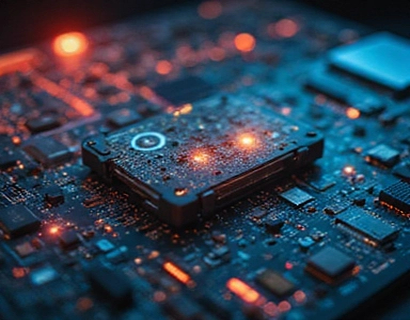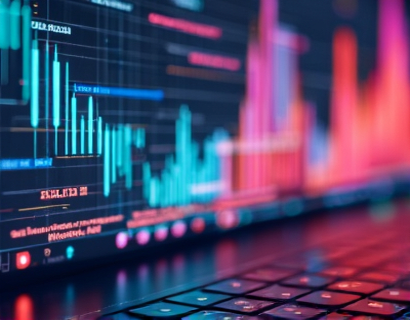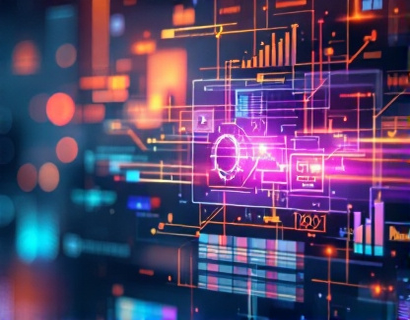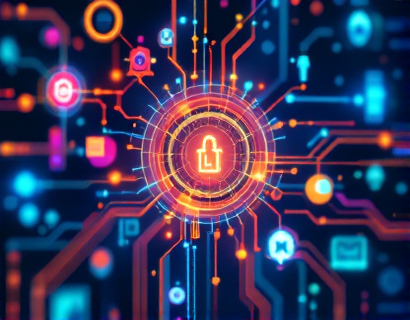The Synergy of AI and Crypto: Revolutionizing Digital Finance
The intersection of artificial intelligence and cryptocurrency is ushering in a new era of digital finance, one that promises unparalleled efficiency, security, and user-centric experiences. This transformative fusion is not just a technological advancement but a paradigm shift that is redefining how we perceive and interact with financial systems. As we delve into this topic, it's essential to understand the foundational elements of both AI and crypto, and how their integration is creating a synergy that is reshaping the landscape of digital finance.
Understanding Artificial Intelligence in Finance
Artificial intelligence, or AI, refers to the simulation of human intelligence processes by machines, particularly computer systems. These processes include learning, reasoning, and self-correction. In the context of finance, AI is leveraged to analyze vast amounts of data, identify patterns, make predictions, and automate complex tasks. The application of AI in finance spans various domains, from algorithmic trading and risk management to customer service and fraud detection.
One of the most significant advantages of AI in finance is its ability to process and analyze big data. Traditional financial systems rely on human analysts to sift through data, which is time-consuming and prone to errors. AI algorithms, on the other hand, can handle massive datasets with speed and accuracy, uncovering insights that would be impossible for humans to detect. This capability is particularly valuable in the crypto space, where market data is vast and constantly evolving.
Cryptocurrency: A Brief Overview
Cryptocurrency, a digital or virtual currency secured by cryptography, operates on a decentralized network known as blockchain. The most well-known cryptocurrency is Bitcoin, but there are thousands of others, each with unique features and use cases. Cryptocurrencies offer several advantages over traditional fiat currencies, including decentralization, transparency, and security. However, they also come with challenges such as volatility, regulatory uncertainty, and scalability issues.
The decentralized nature of cryptocurrencies means that no single entity has control over the network, making it resistant to censorship and manipulation. Blockchain technology, the backbone of cryptocurrencies, ensures that all transactions are recorded in a transparent and immutable ledger. This transparency enhances trust and reduces the risk of fraud, which is crucial in financial transactions.
AI in Cryptocurrency: Enhancing Trading and Investment
The combination of AI and cryptocurrency is particularly potent in the realm of trading and investment. AI-driven trading algorithms can analyze market data, identify trends, and execute trades at optimal times. These algorithms are not bound by human emotions such as fear and greed, which can lead to irrational decision-making. As a result, AI-powered trading can potentially achieve higher returns and lower risks compared to traditional trading methods.
One of the key applications of AI in crypto trading is sentiment analysis. By analyzing social media, news articles, and other online sources, AI can gauge market sentiment and predict price movements. This capability allows traders to make more informed decisions, capitalizing on market trends before they become widely recognized. Additionally, AI can detect anomalies and potential fraudulent activities, enhancing the security of crypto transactions.
Smart Contracts and AI: A Powerful Duo
Smart contracts are self-executing contracts with the terms of the agreement directly written into code. They run on blockchain networks and automatically enforce and execute the terms of the contract when predefined conditions are met. When combined with AI, smart contracts become even more powerful and versatile.
AI can enhance smart contracts by providing predictive analytics and real-time data processing. For instance, AI can analyze market conditions and automatically adjust the parameters of a smart contract to optimize outcomes. This dynamic adjustment capability ensures that contracts remain effective and relevant, even as market conditions change. Moreover, AI can help in the creation of more complex and sophisticated smart contracts, enabling a wider range of applications in areas such as supply chain management, insurance, and real estate.
Personalized Financial Services through AI and Crypto
The synergy of AI and cryptocurrency is not limited to trading and smart contracts; it also extends to personalized financial services. AI can analyze individual user data to provide tailored financial advice, investment strategies, and risk management solutions. This personalized approach enhances user experience and increases the effectiveness of financial services.
For example, AI-driven financial advisors can assess a user's financial goals, risk tolerance, and market conditions to recommend customized investment portfolios. These recommendations are continuously updated based on real-time data, ensuring that the portfolio remains optimized. In the crypto space, this means that users can receive personalized advice on which cryptocurrencies to invest in, based on their specific financial situation and market analysis.
Enhancing Security with AI and Crypto
Security is a paramount concern in both AI and cryptocurrency. The integration of AI in crypto security measures can significantly enhance the protection of digital assets. AI algorithms can detect and respond to threats in real-time, identifying patterns that indicate potential security breaches. This proactive approach to security is crucial in a landscape where cyber threats are increasingly sophisticated.
One notable application of AI in crypto security is the detection of fraudulent activities. AI can monitor transaction patterns and user behavior to identify anomalies that may signal fraud. For instance, if a user's spending habits suddenly change or if there are multiple failed login attempts, AI can flag these activities for further investigation. This early detection can prevent financial losses and protect user assets.
Additionally, AI can improve the security of blockchain networks themselves. By analyzing network traffic and transaction data, AI can identify vulnerabilities and suggest enhancements to the network's security protocols. This continuous improvement ensures that the blockchain remains robust and resilient against attacks.
Challenges and Considerations
While the integration of AI and cryptocurrency offers numerous benefits, it also presents several challenges that need to be addressed. One of the primary concerns is the regulatory environment. The decentralized nature of cryptocurrencies and the complex algorithms used in AI make it difficult for regulators to enforce existing laws and create new ones. This regulatory uncertainty can hinder the widespread adoption of AI and crypto solutions.
Another challenge is the technical complexity involved in developing and maintaining AI-driven crypto systems. These systems require a deep understanding of both AI and blockchain technology, which can be a barrier for many organizations. Moreover, the ethical implications of AI, such as bias in algorithms and data privacy, must be carefully considered to ensure that the benefits of this synergy are realized without compromising ethical standards.
Future Prospects: The Road Ahead
The future of AI and cryptocurrency is bright, with numerous opportunities for innovation and growth. As technology continues to advance, we can expect to see more sophisticated AI algorithms that can better understand and predict market dynamics. This will lead to more accurate trading strategies and more effective risk management solutions.
In the realm of smart contracts, the integration of AI could pave the way for more complex and autonomous contractual agreements. These smart contracts could handle a wider range of scenarios, from automated insurance claims to decentralized governance models. The potential for AI to enhance the functionality and efficiency of smart contracts is vast.
Furthermore, the combination of AI and cryptocurrency is likely to drive the development of new financial products and services. Decentralized finance (DeFi) platforms, for instance, are already leveraging AI to create more accessible and user-friendly financial tools. As the technology matures, we can expect to see even more innovative applications that transform the way we conduct financial transactions and manage our assets.
In conclusion, the synergy of AI and cryptocurrency is a powerful force that is reshaping the landscape of digital finance. By harnessing the strengths of both technologies, we can create more efficient, secure, and user-centric financial systems. As we move forward, it is crucial to address the challenges and ethical considerations while embracing the endless possibilities that this fusion offers.










































